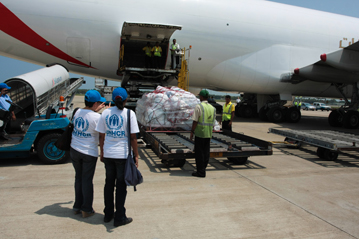UN refugee agency to move ahead with relocation of Congolese refugees
UN refugee agency to move ahead with relocation of Congolese refugees

GENEVA, Aug. 18 (UNHCR) - High Commissioner Ruud Lubbers said Wednesday the UN refugee agency is moving ahead with its plans to relocate newly arrived Congolese refugees in transit centres along Burundi's tense frontier with the Democratic Republic of the Congo (DRC).
Lubbers spoke at a memorial for the 151 Congolese slaughtered during an attack on Friday at the Gatumba transit centre outside the Burundi capital of Bujumbura. Candles were lighted during the ceremony at the agency's Geneva headquarters, capped by a minute of silence for the victims of the attack Lubbers described as an "appalling massacre of innocent civilians."
"We have to relocate these people, it is not safe in the area," Lubbers said, referring to some 20,000 Congolese who fled into Burundi following an outbreak of violence in the DRC's South Kivu province in June. Most of these refugees are in transit centres at Rugombo and Karurama in Burundi's north-western province of Cibitoke which borders the DRC and Rwanda.
Zobida Hassim-Ashagrie, deputy director of UNHCR's Africa bureau in Geneva, visited Cibitoke on Wednesday to look into the situation of the 10,780 Congolese at Rugombo and 6,880 at Karurama. She flew into Bujumbura Tuesday to discuss with Burundian officials arrangements for the transfer of these refugees to a new site away from the DRC border.
On Monday, the Burundi government finally agreed to UNHCR's repeated request to relocate the Congolese, offering Giharo in the south-eastern province of Rutana, about 120 km from Bujumbura. Work on the site will begin shortly, and transfer of the refugees there will begin as soon as basic facilities have been set up.
Meanwhile, UN peacekeepers have tightened security along the borders of Burundi and the DRC. UN troops also deployed at Rugombo and Karurama, following UN concerns about the possibility of further ethnic violence in the region, including reprisal attacks.
Gatumba, which hosted 860 Congolese before the attack, has been closed. Most of its residents had been moved to a nearby school. Some went spontaneously to Bujumbura to find accommodations. Since the arrival of the refugees, UNHCR has expressed concern at the security situation in the areas around the transit camps, and has been urging Burundi government to provide a secure camp well away in the interior.
Western Burundi is a high-risk zone and has been under phase four of the five-stage system of security alert in the UN. On Aug. 2, UNHCR began relocating some of the refugees in the transit centres to Gasorwe camp in the interior of northern Burundi. However, Gasorwe was already crammed with 8,000 Congolese refugees who had arrived years earlier.









